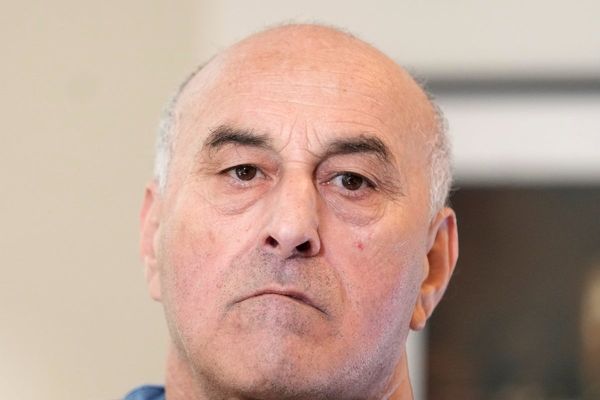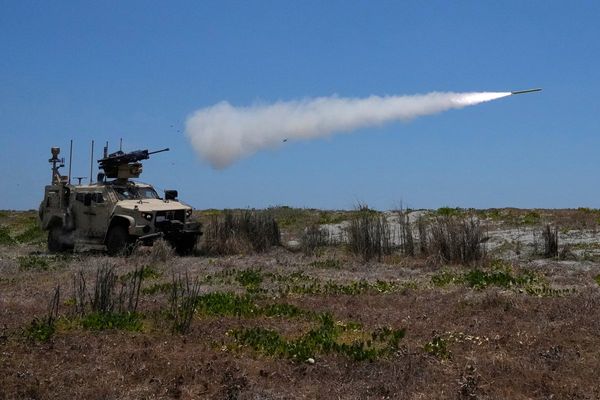
In recent weeks, Russia’s Deputy Defence Minister Yunus-Bek Yevkurov and General Andrei Averyanov from the GRU military intelligence agency have made several trips to Africa. The two are increasingly seen as the main organisers of the post-Prigozhin era of Russian relationships with Africa following the Wagner Group chief’s demise in a fiery plane crash at the end of August.
Yunus-bek Yevkurov, Russia's Deputy Defence Minister, and Andrei Averyanov, a notorious general from the GRU military intelligence agency, touched down in Bamako, Mali, on Saturday, September 16. They were slated to meet political leaders from Mali, Burkina Faso and Niger, according to local media and various sources on Telegram.
This was not the first of the duo’s visits to Africa. They have made several visits to the continent since the death of Yevgeny Prigozhin on August 23, 2023... and even prior to that. Yevkurov, always flanked by Averyanov, was in Libya – one of the main African bases for Wagner's mercenaries – the day before the plane crash back in Russia which killed the Wagner Group chief, as well as two others from the organisation’s top leadership who could have replaced him.
Yevkurov, the negotiator
The meeting in Mali was not coincidental: Yevkurov and Averyanov were scheduled to hold talks with representatives of the countries Prigozhin had last visited. Riley Moeder, an Africa specialist studying the role of Wagner’s mercenaries on the continent at the New Lines Institute, an American geopolitical research center, holds that Russia is playing on a sense of continuity: “Prigozhin was filmed in that region before his plane crashed, and this region is looking for support. So Moscow wants to assure them that it remains committed to that region," she says.
The Russian deputy defence minister had already visited Mali and Burkina Faso in the first week of September to assure local authorities that Moscow would “do everything in its power to help” them, The New York Times reported in an investigation into the future of Wagner's African "empire" published on September 8.
Yevkurov and Averyanov would therefore appear to African leaders to be the successors to the late Wagner boss. What’s more, as The New York Times reports in the same investigation, they also met with some of the remaining Wagner mercenaries in Mali. Several media outlets have already presented the GRU’s Averyanov as "Prigozhin's successor" in Africa.
Indeed, the profiles of both men correspond to some of the roles hitherto played by Wagner's former leader.
For example, Deputy Defence Minister Yevkurov is a decorated general with “quite a good military reputation", says Ivan Klyszcz, a specialist in Russian foreign policy at the International Centre for Defence and Security in Estonia. That may be enough to inspire respect among the Wagner mercenaries.
Yevkurov also has a solid reputation as a peacemaker and negotiator from his time spent in Ingushetia, an autonomous republic of the Russian Federation located in the Greater Caucasus mountain range. He led this Russian republic from 2008 to 2019, at a time when the region “was more violent than Chechnya", says Klyszcz, who has focussed on this part of Russia. “The region was almost as safe as everywhere else in Russia when he left."
For the Kremlin, Yevkurov has a certain diplomatic finesse that is perfectly suited for being "the new face of relations between the Russian government when dealing with these African regimes", says Andreas Heinemann-Gruder, a Russia specialist who studies private paramilitary groups at the University of Bonn.
Averyanov and the GRU assassins
Diplomatic finesse is arguably not Averyanov's strong suit. General Averyanov is best known for having led the GRU's infamous 29155 unit, which specialises in covert operations like sabotage and assassination. Spies from this unit are suspected of having blown up an ammunition depot in the Czech Republic in 2014, attempting to stage a pro-Serbian coup in Montenegro in 2016 and the attempted poisoning of former double agent Sergei Skripal in 2018.
Read moreUnit 29155, the Russian spies specialising in ‘sabotage and assassinations’
In other words, "[Averyanov’s] qualification is preparing special operations abroad. He is the ‘hit and kill guy’ you call when you need this kind of service," says Heinemann-Gruder.
What's in it for African regimes? "Averyanov can … take over some elements of regime security, and not only bodyguard services, but also in [his] area of specialisation: repression and targeted assassination," adds Klyszcz.
But Averyanov is more than a cold-blooded killer. "Averyanov is a decorated veteran from Afghanistan and Chechnya and was also active in Moldova and Crimea. As with all Russian special operatives, he is trained to take the initiative, operate cut off from superiors’ orders, and make links with local allies," says Jeff Hawn, Russia specialist and an external consultant for the New Lines Institute. This pedigree makes him an ideal candidate to negotiate with local military groups, just as Wagner's managers would do when arriving in a new country in Africa.
Yevkurov, the shrewd politician, and Averyanov, the master spy, thus appear to be as different as they are complementary. However, they both have one quality in common setting them apart from the late Yevgeny Prigozhin: "They’re both reliable, loyal soldiers who are not the type of personality which could be expected to ‘go rogue’,” says Hawn.
"Loyalty is a very powerful advantage in the Putin system right now," says Klyszcz. This would be especially the case for anyone aspiring to take over for Prigozhin, who, after his abortive rebellion attempt against the Russian defence ministry in June, came to epitomise treachery in the eyes of the Russian leadership.
More openly official support
Is all of this enough for the Kremlin to hand the keys to Wagner’s kingdom in Africa to the duo? According to the experts interviewed by FRANCE 24, they will play a role, but not as sole operators. Yevkurov and Averyanov embody, as representatives of the Russian state, a move from the semi-clandestine operations and relations carried out by Wagner to more open relations with the African regimes in place. "It’s no longer hybrid warfare but official support. They show that communication is continuing with Russia, but now through official channels,” says Heinemann-Gruder.
But this does not mean that the structures set up by Wagner will simply be absorbed by the Russian ministry of defence. Wagner’s very decentralised model is still useful to Moscow, because “it's easier to adapt to local situations. What is happening in Mali is not what is happening in the Central African Republic," says Moeder. The situation in Mali, with its imperative to fight terrorism, has little in common with the nature of operations in the Central African Republic, where Wagner's main aim is to secure lucrative mining activities. Wagner also runs propaganda operations in several countries and even manages a brewery and vodka distillery in the Central African Republic.
Such diverse activities and hybrid warfare, wherein conventional tactics are blended with subversive actions, "require greater dexterity than the Russian security bureaucracy is likely capable of", writes Joseph Siegle, Director of the Center for African Strategic Studies at the National Defense University in Washington, in an article published on The Conversation.
Finally, it will still be useful to let the mercenaries carry out certain actions to be able to continue denying official involvement on the part of Moscow in the event of exactions or reprisals in a country.
Yevkurov and Averyanov are thus an important part of the first stage of the reorganisation of Russian operations in Africa. "The Russians are beginning to learn some lessons from past experience with Wagner and other PMCs (private military companies). We can expect less autonomy and clear political leadership," says Heinemann-Gruder.
And if Moscow’s progress in taking control of operations is rather slow, it's also because the Wagner Group also has well-entrenched financial interests in Africa. "There is a web of [Russian] oligarchs and businessmen who benefitted from Prigozhin’s businesses and shell companies, and who have everything to gain from the system remaining,” says Moeder. Moscow’s interests therefore also lie in making sure that everyone involved in Wagner’s African operations continues to benefit.
This article was translated from the original in French.







